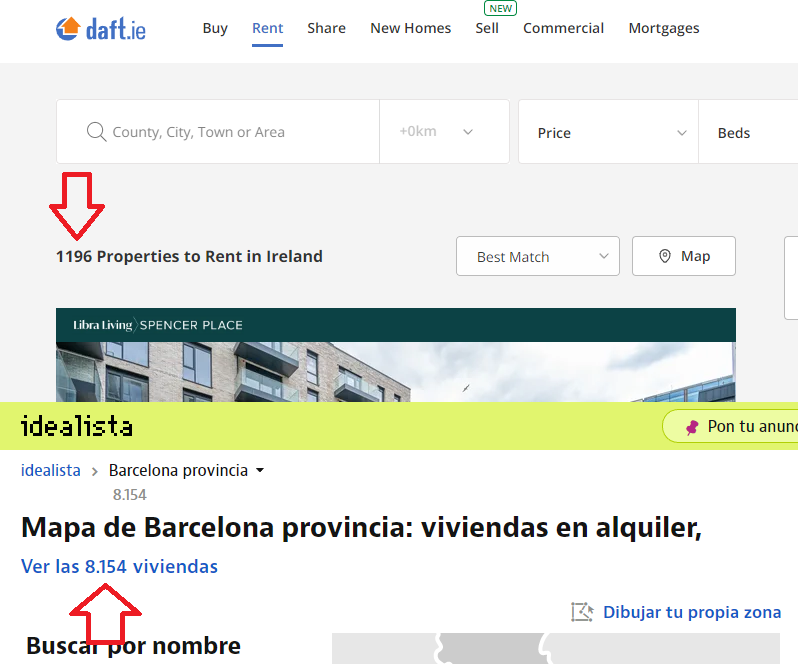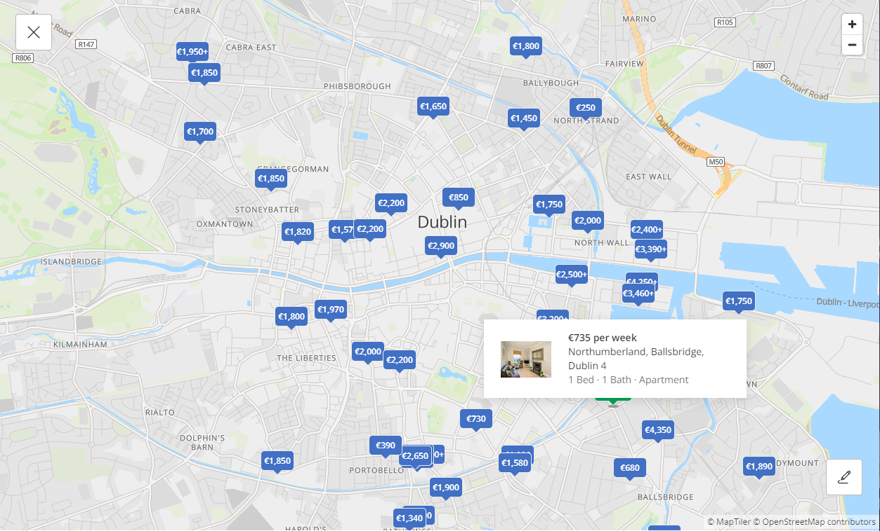Every time I make a post or video about Ireland, the same questions always come up: how much do you earn in Ireland, or if with X or Y amount of money it's enough to live, usually in Dublin.
Before we begin, all of this information is taken from referenced sources, my own experience, or from acquaintances I interviewed for this post.
Contents
1 - Seniority and Developer Salaries in Ireland
All information about salaries is taken from a recruitment company, Ninedots, specifically from this PDF, which I find quite accurate.
In this post, we will look exclusively at Software Engineering, but in the PDF you have design, Scrum Master, data analyst, etc. All salaries are in euros.
Before starting with the list, salaries are high, but once you are here you realise they are not that high, because, as always, they are in line with the cost of living.
During this post, we will see all the details.
- Note: Amounts are in euros and yearly unless otherwise stated.
1.1 - Graduate, Just Finished Studies
Although 'graduate' is not in the PDF, I can tell you, graduate salaries usually range from 25k to 30k. Personally, I don't recommend coming to Ireland as a graduate.
There are two main reasons for this:
- You need a level of English known as 'Professional working proficiency', usually equivalent to an advanced B1 or almost B2, along with knowing the professional vocabulary. Many times we think we have a B1 or B2 level, but then you go to the country and realise otherwise, as the language is spoken faster and the jargon is not as expected. Of course, English can be learned.
- There's a lot of demand. For graduate roles, demand is extremely high, and people, as everywhere, apply for absolutely everything. Just like you wouldn't hire someone not living in the country, here they don't hire someone from abroad when there are enough people locally.
If you move to Ireland, you only compete with those already here, and your level of English, character, and skills will determine if you're hired. But staying in Ireland without a job is expensive, as we'll see below.
1.2 - Juniors, 1 to 3 Years
As stated in the PDF, 45k to 60k. In my opinion, that might be a bit high, but the cost of living has changed since I was a junior, so it's probably correct.
It's easier to find remote work from abroad at this level. Of course, your English skills will be key, as well as the area you start specialising in.
By the way, for entry levels, juniors, and even some mid-levels, you will be asked for references from your previous companies, so please do not lie on your CV.
1.3 - Mid-level, 3 to 5 Years
From 65k to 75k, this is the hardest range to define because it's the point where you're definitely not a junior anymore, but not yet a senior. I think it's correct.
1.4 - Senior Engineer, 5 to 7 Years
Although the PDF indicates 5 to 7 years, I think of senior engineers as 5+. Many developers never go beyond senior, either because they don't want to (moving up to principal or tech lead adds responsibilities) or because it's their level and they're happy here.
Salaries go from 80k upwards, as always, these are for people living in Ireland. If you live in Spain or LATAM, you might be offered 40 or 50k knowing salaries are lower in those countries.
- NOTE: Some people move from Senior to Staff Engineer, and salaries increase further, but that's usually in multinationals, mainly American.
1.5 - Principal engineer
This part is more or less like the previous one, from 5 years' experience onwards, depending on the company. In one place I worked, you could be a principal with 3 or 4 years' experience, in others it required 10 or 12 years.
This role, in most companies, also involves being the team lead, so you'll have people under your care, more technical meetings, etc.
In terms of salary, it varies but goes from 80k (like a senior) to more common figures of 100k. The PDF states 120k, but I have my doubts. In multinationals, yes, but most companies are not multinationals.

2 - Taxes in Ireland
The idea that you don't pay taxes in Ireland is an urban myth. Well, not exactly; companies often don't pay, and not all, most do. Only those who can afford tax engineering don't pay, but I won't get into that.
In Ireland, we workers pay A LOT of taxes and I will break it down for you, and at the end, you'll see a table with different salaries and final take-home pay.
All this information is taken from the official website of the Irish equivalent of the tax agency.
2.1 - PAYE, Paying According to What You Earn
Similar to Spain's IRPF, you have a salary and a % goes straight to the government.
As of today (for 2023), the brackets for singles are as follows (for married couples, it's a bit different):
- 0 euros up to 40k pays 20%
- from 40k upwards, you pay 40%
And this is progressive, meaning if you earn 41k, you pay 40k at 20% and 1k at 40%, not all 41k at 40%.
Also as a note, everyone has what's called 'tax credit', which this year is €3550, untaxed. If married, tax credits and percentages are combined and that's why married people pay slightly less.
2.2 - PRSI, Social Insurance
Similar to social security, the employee pays 4%, and depending on your earnings, your company pays an additional 8.5% or 10.75%.
2.3 - USC, Universal Social Charge
This tax is basically a rip-off, since it was supposed to be temporary to offset the past crisis, but here it is. But you have to pay, there's nothing you can do.
Like PAYE, it is also progressive.
- The first €12,012 are taxed at 0.5%
- The next €10,908 at 2%
- The next €47,124 at 4.5%
- And from there, 8%
This means that, for a senior salary we saw in point 1.4 of €80,000 per year, everything you earn from €70,044 onwards is taxed at a total of 52% (40% PAYE + 4% PRSI + 8% USC). Or, in other words, for every €100 you earn, €52 goes to the state.
2.4 - Pensions in Ireland
As an important point, pensions in Ireland are mixed, meaning the government gives an amount, and then individually you can have a private pension.
Currently, the maximum public pension is €12,000 per year, and even those 12 thousand euros are taxed.
What people do is get a private pension; for example, you can designate a percentage of your salary for your pension, and that percentage is NOT taxed. Additionally, companies usually match that amount (up to a limit, usually 5% of your salary, increasing for executive positions).
For example, if you earn a €50,000 yearly salary, out of that, if you put 5% towards a private pension, that's €2,500, the company adds another €2,500, and you don't pay tax on that money. Well, actually, you defer the taxes until retirement, but generally, unless you are in the lowest tax bracket, it's worth getting a private pension.
Note: Private pensions are investment banks, funds, etc., meaning they can either go bust or grow a lot. They also charge a 2% ANNUAL maintenance fee, which, considering compound interest, 60% of what you invest is taken as fees. But well, that's another topic.
2.5 - How Much Do I Take Home at the End of the Month?
For this section, I'm using the website 'thesalarycalculator' for Ireland, as it's the simplest for me.

As you can see, the level of taxes is very similar to Spain. You pay a little more in Ireland, but not by much. Also, salaries are high, so €3,000 a month for a junior is a lot, but those salaries correspond to the high cost of living.
3 - Cost of Living in Ireland
The cost of living in Ireland is extremely high, especially when it comes to housing. It’s gotten to the point where many companies are starting to build houses for their employees, because rentals are either extremely expensive or simply unavailable.
For example, I live in a central county and in August 2023 there were only 16 houses and apartments for sale. In the whole country, as I write this, there are 1,196 apartments/houses to rent (on daft).
To give an idea, the province of Barcelona has 5.5 million inhabitants, 10% more than Ireland, but 8,098 apartments or houses for rent (on idealista), 700% more than Ireland.

Of course, as happens in Barcelona city, the problem is much greater in Dublin.
3.1 - Housing in Ireland
All information and screenshots are from daft.ie. Since these questions usually come from people who do NOT live in Ireland, I'll also describe what it's like to move to Dublin, where most companies are. Galway and Cork also have plenty of companies and prices are a bit lower, though they're much smaller cities.
IMPORTANT NOTE: NEVER send money from your country, or even from within Ireland to reserve an apartment unless you have seen it or a company is handling it. I know several people who found 'bargains' and turned out to be scams, so be very careful.
A - One-bedroom Apartments in Ireland
Highly sought after by those who want to live alone, prices start from €1,400 a month and up. It is very difficult to find anything cheaper, unless it's very far away. In fact, being walking distance (30/45 minutes) from the center or offices, the most common rent is €1,800 a month.

The one you see at €740 is weekly, not monthly.
Dublin has two tram lines, and prices near these are also quite high. However, in these areas there are hardly any apartments, most properties are houses.
And if you combine this info with the salary levels mentioned before, with a 45k salary (roughly €3,000 per month), you CANNOT live alone. Or well, you can, but you might have to eat pasta every day to pay the rent.
Also, these are usually one-bedroom apartments with very little room; in many, you won't even be able to put a sofa bed.
B - Family Apartments or Houses in Ireland
I'm counting 2+ bedroom apartments or houses, which is what people ask about most. In this range you'll pay €2,500 or more in areas 30/40 minutes from the center or farther out, needing a car or the bus, and it will take you about 45 minutes to 1 hour to get to the center. Right now, there are 129 homes that meet these criteria.
Figure each additional bedroom adds about €900-1,000 if it's farther from the center, and between €1,200-1,500 per room if it's closer.
Many people move to dormitory towns, which are usually cheaper because there is a morning bus to Dublin city center. But this only works if your job is in the center. If it's in a tech park, you will need a car, which is unthinkable when you first arrive. Plus, bus or train tickets are €10-15 a day, since most are private companies, not public lines.
And, as you can imagine, you need a good salary to pay for a house like that.
In more rural areas or cities of 20,000 or 30,000 people, prices are much lower, with average room prices around €500. If you live in the north, such as Sligo or Donegal, it's even cheaper, but it's rare to find companies there, and there are a lot fewer rentals.
C - Bidding War
Something that's not talked about, but happens both in rentals and when buying a home, is the bidding war. For example, you go to see a place, they ask €2,000 for two bedrooms, but it's a very good place. Many times you have to go and bid higher than they ask, because you basically get into a war with other people to get the place.

That's what's called a 'Bidding war' in English, and unfortunately it's completely common, legal, and I've had to participate in many :(
D - Flat Sharing in Ireland
In the end, it's the most common option, especially for those with a seniority level below senior, since salaries make it impossible to live alone, so the best bet is to look for a room and share.
Room sharing prices are similar to the family unit mentioned above, about €900-1,000 per room, or more in better places, and of course, you have to add costs for electricity, heating, internet, etc.
Personally, I think there's a time in life when sharing a flat is good, but if you live alone in Spain or your home country, going back to sharing a flat can be very tough, and if you are adults with families, even tougher. Still, that's just a personal opinion.
3.2 - Healthcare in Ireland
I've always heard that healthcare in Spain is the best. Well, in my opinion, it is. Here in Ireland, there’s public and private healthcare. And personally, my private experience has been VERY BAD.
The only time I needed to go to the doctor with private insurance was after breaking my ankle playing football. I called the insurer, they told me which hospital to go to, so I went and after two hours waiting, they told me the radiologist wouldn’t be there until the next day (it was about noon when I arrived), so they couldn’t do anything that day. So I had to go to a specialised clinic, where they confirmed the fracture and bandaged it. Of course, I had to pay and the insurer washed their hands of it.
That day, I promised never again; after paying insurance for two years, I cancelled it.
Healthcare in Ireland is different from Spain (no idea about LATAM), here there are no public clinics or assigned general practitioners. There’s a GP, which is a doctor with a private clinic. You pay, and that’s it, it’s like your regular doctor. The price is usually €50, and if you have to come back, €30.
And then if you need a blood test or whatever, the GP gives you a refe... (truncated for length)

